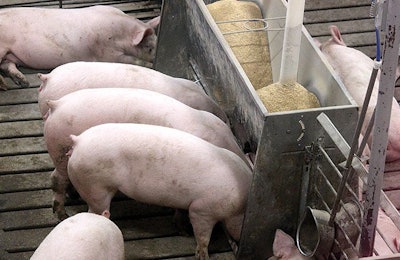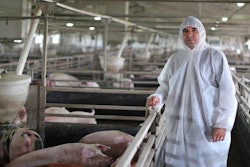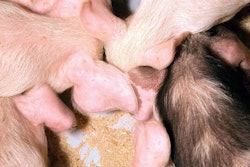
African swine fever (ASF) may be on the wane as there has been a drop in the number of cases officially recorded in recent days, but the impacts are being felt by Chinese consumers with pork prices rising.
Further ASF outbreaks have occurred in Romania, Ukraine and Vietnam, but new research offers hope for future control of the disease among European wild boar populations.
Based on official reporting to the World Organisation for Animal Health (OIE), the worldwide ASF situation might appear to be abating, as the few cases confirmed in the past week have been in small non-commercial herds of domestic pigs, and in the European wild boar population in areas of previous outbreaks.
Over the past seven days, China’s ministry of agriculture has reported no new cases of the disease. Restrictions imposed in the Shizhou district of Chongqing after previous outbreaks have been lifted after no new cases were identified in a period of six weeks of monitoring and investigation.
Repercussions of the loss of pigs from ASF in China are now beginning to hit home, as the price of pork has jumped sharply upward. The jump of more than 14 percent during March pushed consumer price inflation to 2.5 percent in April, reports South China Morning Post. Cost of living is now at its highest in China for six months. The shortage of supply is exacerbated by China’s ban on pork imports from Canada, and those from the U.S. subject to tariffs of 62 percent for frozen meat and 70 percent for fresh pork.
There have been three ASF outbreaks in Vietnam this week, reports Vietnam News. These occurred in the provinces of Yen Bai, Quang Tri and Dong Nai. The last of these is a worrying development as the province is in the Southeast Region and a key area for pig production in Vietnam.
In the first four months of this year, the country’s Animal Health Department recorded ASF outbreaks in 20 localities, and more than 85,000 pigs were culled.
Romania, Ukraine report new outbreaks in backyard herds
Romania’s national veterinary service has reported to the OIE two recent outbreaks of ASF in domestic pigs. These occurred at the end of April and affected 21 animals in the counties of Bihor in the northwest of the country, and Vrancea in the east.
After a brief absence, ASF has returned to the Sumy province of northeast Ukraine, affecting two pigs. The ASF virus was last detected in that region in January, according to the official report to the OIE from the State Service on Food Safety and Consumer Protection.
Animal health agencies in two countries have reported to the OIE that no new cases of ASF in domestic pigs have been detected for around two months.
For the Republic of Moldova, there have been no cases since a single outbreak in March.
Zimbabwe’s veterinary services department has reported no new cases for two months after ASF-related mortalities began among free-ranging village pig herd in Manicaland at the end of January. The district remains under quarantine, and active surveillance and awareness campaigns are still ongoing in the area, according to the official report to the OIE.
More cases among European wild boar
Notifications to the OIE of new cases of ASF in wild boar appear to be in decline, but outbreaks have been recorded in three countries over the past week. Worst affected was Romania (23 cases), followed by Belgium (20, all in the province of Luxembourg) and Russia (five).
The disease has been eliminated from the Volyn region of Ukraine, according to the official report from the state’s animal health service to the OIE.
View our continuing coverage of the African swine fever outbreak.
















